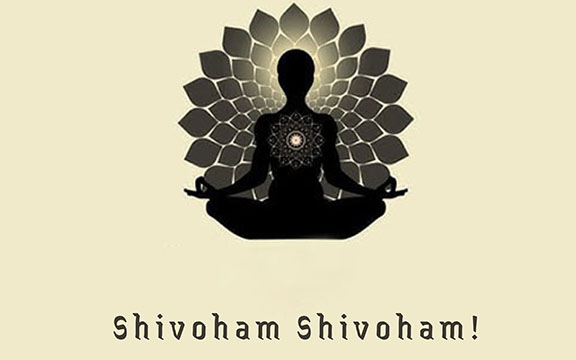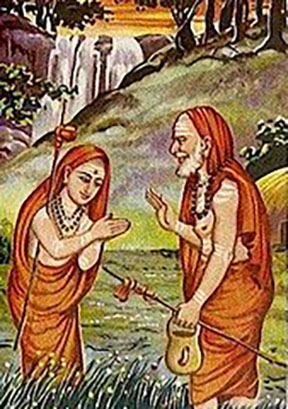
The inspiring affirmation contained in Adi Shankara’s Nirvana Shatakam
The profound Nirvana Shatakam stotra (hymn of praise) was composed by Adi Shankaracharya, the great 8th-century philosopher and sage, who stands as one of the most profound spiritual figures in India’s history. His teachings revitalized the understanding of Advaita Vedanta, the philosophy of nonduality, which proclaims the oneness of the individual soul (jivatman) and the Supreme (paramatman).
Shankara’s life was devoted to dispelling ignorance and reaffirming the timeless truth that beyond all worldly distinctions, the essence of existence is pure, unchanging Consciousness—Brahman.
As a young seeker, he journeyed across India, engaging in deep philosophical debates, composing commentaries on the scriptures, and establishing monastic centers (mathas) that continue to preserve his teachings. Integral Yoga sannyasis (swamis) are part of the monastic order and spiritual tradition (parampara) established by Adi Shankaracharya. Among his many devotional hymns and philosophical compositions, Nirvana Shatakam shines as a jewel of self-inquiry and spiritual realization.
The Inspiration Behind Nirvana Shatakam
According to tradition, young Shankara, wandering as a renunciate, encountered a great sage who became his Guru, Sri Govindapada. When asked, “Who are you?” Shankara did not respond with his name, lineage, or background. Instead, he expressed his realization in six verses, revealing his identity not as the body, mind, or emotions, but as the infinite, blissful Consciousness—Shivoham (I am Shiva). These six verses became known as the Nirvana Shatakam, the “Six Verses on Liberation.”
Each verse peels away false identifications—of body, mind, emotions, and individual identity—to reveal the undivided Self that is beyond all attributes. It is a hymn of direct insight, an echo of the Upanishadic declaration, Tat Tvam Asi—“Thou Art That.”

Painting: Depiction of Sri Shankara meeting his Guru, Sri Govindapada.
Meaning and Essence of Nirvana Shatakam
The six verses systematically negate all limiting identities. Let’s explore the essence of the hymn and you can chant along with Gaiea.
- manobuddhyahaṅkāra cittāni nāhaṃ
na ca śrotrajihve na ca ghrāṇanetre
na ca vyoma bhūmirna tejo na vāyuḥ
cidānandarūpaḥ śivo’ham śivo’ham ||1|| Not the Mind, Not the Body
I am not the mind, the intellect, the ego, or memory. I am not the ears, the tongue, the nose, or the eyes…
Shankara begins by rejecting all physical and mental faculties as his true Self. We often define ourselves by our thoughts, emotions, or bodily experiences, but these are ever-changing. The unchanging reality is beyond them. At the end of each verse, the repetition of “Shivoham” anchors us in this truth, dissolving worldly identities in the vastness of Divine Consciousness. - na ca prāṇasaṃjño na vai pañcavāyuḥ
na vā saptadhātuḥ na vā pañcakośaḥ
na vākpāṇipādaṃ na copasthapāyu
cidānandarūpaḥ śivo’ham śivo’ham ||2|| Not the Senses, Not the Elements
I am not space, nor the earth, nor fire, nor wind…
Even the fundamental elements that compose the universe are not the Self. By negating one’s identity as those, the seeker is led inward, beyond the gross and subtle layers of existence. - na me dveṣarāgau na me lobhamohau
mado naiva me naiva mātsaryabhāvaḥ
na dharmo na cārtho na kāmo na mokṣaḥ
cidānandarūpaḥ śivo’ham śivo’ham ||3|| Beyond Attachments and Desires
I have no hatred or attachment, no greed or delusion…
Identifications with emotions, likes and dislikes, and worldly desires also dissolve. The nature of the true Self is freedom, for in fact, we were never bound. - na puṇyaṃ na pāpaṃ na saukhyaṃ na duḥkhaṃ
na mantro na tīrthaṃ na vedā na yajñāḥ
ahaṃ bhojanaṃ naiva bhojyaṃ na bhoktā
cidānandarūpaḥ śivo’ham śivo’ham ||4|| Beyond Birth and Death
I have neither virtue nor vice, neither pleasure nor pain. I have no father, no mother, no birth…
The Self is beyond all social and biological constructs. Death and rebirth do not belong to the real Self, which is eternal. - na mṛtyurna śaṅkā na me jātibhedaḥ
pitā naiva me naiva mātā na janmaḥ
na bandhurna mitraṃ gururnaiva śiṣyaṃ
cidānandarūpaḥ śivo’ham śivo’ham ||5|| The Ever-Free Witness
I need no offerings, no rituals, no scriptures. I am not bound by sacred words or pilgrimages…
True liberation is not dependent on external acts. The Self is already free—pure and unchanging Consciousness. - ahaṃ nirvikalpo nirākārarūpo
vibhutvācca sarvatra sarvendriyāṇām
na cāsaṅgataṃ naiva muktirna meyaḥ
cidānandarūpaḥ śivo’ham śivo’ham ||6|| The Supreme Truth: Shivoham
I am Consciousness, Bliss, and Ever-Present Divinity—Shiva, Shiva, I am That!
The final verse affirms the supreme realization: Shivoham—I am Shiva, pure, formless, boundless Consciousness.
The Benefits of Chanting Nirvana Shatakam
Chanting or meditating on Nirvana Shatakam has profound effects:
- Freedom from Fear and Suffering – By realizing that we are beyond birth, death, and worldly experiences, we loosen the grip of fear and suffering.
- Inner Stillness and Clarity – As we contemplate these truths, mental noise subsides, and a deep stillness arises.
- Overcoming Ego and Illusions – The hymn leads us beyond the illusion of separateness, dissolving the ego’s grip.
- A Direct Path to Liberation – Rather than complex rituals, Nirvana Shatakam offers a clear, direct path to Self-realization.
- Divine Recognition – Regular chanting of this stotra elevates one’s mind and leads to the recognition of one’s true nature, pure Consciousness, the infinite Reality.
Nirvana Shatakam is more than a chant—it is a call to awaken to our boundless nature. As Adi Shankaracharya reminds us, we are not limited by mind, body, or worldly identifications. We are that which is eternal, ever-free, and full of bliss—Shivoham, Shivoham.
By integrating this profound wisdom into our Yoga practice and daily contemplation, we inch closer to the realization that we were never bound, only dreaming of limitations. May the verses of Nirvana Shatakam guide all seekers toward the recognition of the true, infinite Self.

